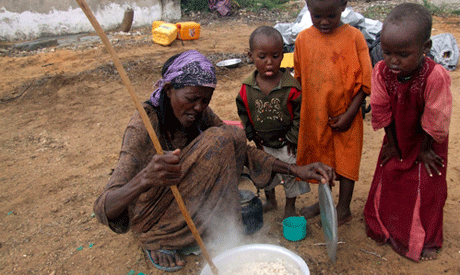
A Somali woman from southern Somalia, prepares food as her children watch at a camp for internally displaced people in Mogadishu, Somalia (Photo: AP)
"The United Nations declared today that famine exists in two regions of southern Somalia: southern Bakool, and Lower Shabelle," a statement by the UN Office for the Coordination of Humanitarian Affairs for Somalia said. Both are areas controlled by Al-Qaeda inspired Shebab insurgents.
The extreme drought is affecting more than 10 million people in the Horn of Africa.
"Across the country nearly half of the Somali population -- 3.7 million people -- are now in crisis, of whom an estimated 2.8 million people are in the south," the statement read.
"Consecutive droughts have affected the country in the last few years, while the ongoing conflict has made it extremely difficult for agencies to operate and access communities in the south of the country," it added.
Officials warned that unless urgent action were taken the areas afflicted by famine would grow. "If we don't act now, famine will spread to all eight regions of southern Somalia within two months, due to poor harvests and infectious disease outbreaks," Mark Bowden, the UN humanitarian coordinator for Somalia, told reporters.
Countries affected across the region include parts of Kenya, Uganda, Ethiopia and Djibouti, while the United States on Tuesday also urged secretive Eritrea to reveal how severely it has been hit by the drought.
Mortality and malnutrition rates are comparable to or exceed recent crises in Niger in 2005, Ethiopia in 2001 or Sudan in 1998, the UN said.
"Given the combination of severity and geographic scope this is the most severe food security crisis in Africa since the 1991/2 Somalia famine," the UN added.
Famine implies that at least 20 percent of households face extreme food shortages with limited ability to cope, acute malnutrition in over 30 percent of people, and two deaths per 10,000 people every day, according to the definition released by the UN.
The Shebab expelled foreign aid groups two years ago, accusing them of being Western spies and Christian crusaders.
However, the UN last week airlifted in the first supplies since the group said it would lift restrictions on aid. Malnutrition rates in Somalia are currently the highest in the world, with peaks of 50 percent in certain areas of southern Somalia, Bowden added. "Every day of delay in assistance is literally a matter of life or death for children and their families in the famine affected areas," Bowden said.
Over 78,000 Somalis have fled to seek refuge in neighbouring Ethiopia and Kenya in the last two months.
In Kenya, they are streaming into overcrowded camps hosting some 380,000 people -- more than four times the original capacity.
On Tuesday, the UN refugee agency said death rates among refugees arriving in Ethiopia's Dolo Ado area reached 7.4 per 10,000 in June, 15 times more than the baseline rate in sub-Sahara Africa.
UN agencies will hold a meeting Monday in Rome over the drought-sparked humanitarian crisis.
Meanwhile the United States on Tuesday urged Shebab rebels to let humanitarian workers operate unhindered, saying that the movement was a major reason for the country's hunger crisis.
"If we are not able to intervene immediately, tens of thousands more Somalis may die," the UN added.
Short link: